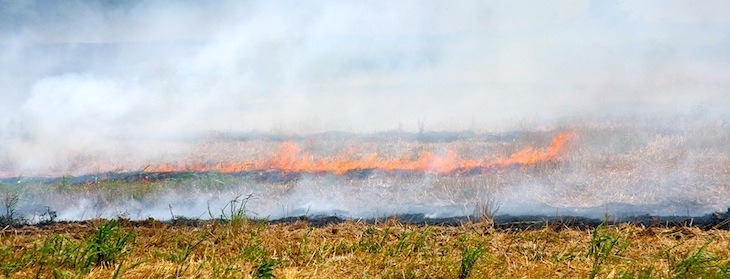Farmers hope to find field burn fix without legislative action
by May 16, 2018 3:01 pm 1,301 views

Farmers in Northeast Arkansas are working to finish planting this year’s crops, but the success of this year’s efforts won’t be known until harvest time several months down the road.
What also won’t be known until the 2018 crops are out of the fields is how successful Arkansas’s new voluntary guidelines for burning the post-harvest residue are in managing the smoke produced by the fall field fires. Farmers often burn the residue left after harvest in order to prepare their fields for the next year’s crop. The leftover organic material can harbor nuisance weeds, plant diseases and insects that can affect future crops.
Joe Christian, who farms 3,700 acres in western Craighead County near the Cache River, is a member of the board of directors of the Craighead County Farm Bureau and serves as a regional representative to the Arkansas Farm Bureau for eight eastern Arkansas counties.
“The reason we burn is economics,” Christian said.
In addition to reducing diseases, weeds and insects, Christian said, “If we had to till it,” turning the stubble under would dramatically increase costs to the farmers. “If a tractor uses 15 gallons of fuel per hour to work in the stubble, and it takes four passes over a field,” then turning the stubble under could add $100 per acre to the cost of producing a crop.
Arkansas farmers are interested in making sure U.S. consumers have access to the “cheapest, safest, most affordable food” supply in the world, he said.
But burning of crop stubble in the fall produces complaints about the clouds of smoke from the burning fields, especially in Northeast Arkansas. Smoke can impact towns and sensitive areas, such as schools and nursing homes. Smoke can obscure drivers’ vision, making travel hazardous, and it can impact those with respiratory disorders.
Children sometimes have to restrict their outdoor activities because of the smoke in the fall in Northeast Arkansas, said, Dr. Warren Skaug, a pediatrician in Jonesboro for more than 30 years. Skaug has addressed legislators about the situation, hosted meetings on the topic and worked with the rice industry in regard to it. Representatives of the rice industry formed a task force to address the issue.
“We’ve been all winter talking about this,” Christian recently told the Jonesboro University Rotary Club.
As a result of discussions, the Arkansas Voluntary Smoke Management Guidelines for Row Crop Burning were developed and published earlier this year.
The guidelines, modeled after the smoke management guidelines employed in Arkansas’ timber industry, ask farmers to complete a standard Safe Burning Checklist and call and report their crop burns to the Arkansas Agriculture Department’s Dispatch Center. The center will map each planned fire in the center of the airshed — 36 square miles — in which it is located. If the crop residue tonnage for a planned fire causes the fuel loading tonnage for a given airshed to cross a certain threshhold, the center will recommend — not order — the farmer to alter the plan either by delaying the burn or reducing the acreage to be burned. That will make it so “it’s not everybody burning at once,” Christian said.
Eliminating crop residue by burning is an efficient method, Christian said, adding “We don’t want to lose it. But we want to be a good neighbor,” evidenced, he said, by the fact that “in the last 10 years, agriculture has reduced its carbon footprint by 20%.”
Rice, wheat, corn and soybean producers are the primary users of burning to eliminate crop residue, though rice producers use it the most. Some 25% of Arkansas rice fields are burned after harvest. Soybean and corn residue “burn slower and longer than rice,” Christian said.
Wes Ward, a Craighead County native and director of the Arkansas Agriculture Department, said his agency will track the number of calls to the center. Though the department can quantify the calls, determining how well the system works this fall will perhaps be more difficult, he said. Ward previously told Talk Business & Politics that “a lot of it [success] will be public perception.”
Christian agreed, saying “farmers are going to have to buy into it” to ensure that the voluntary guidelines remain voluntary.
“Legislators have told us they don’t want to get involved. They want us to fix this ourselves,” he said.
